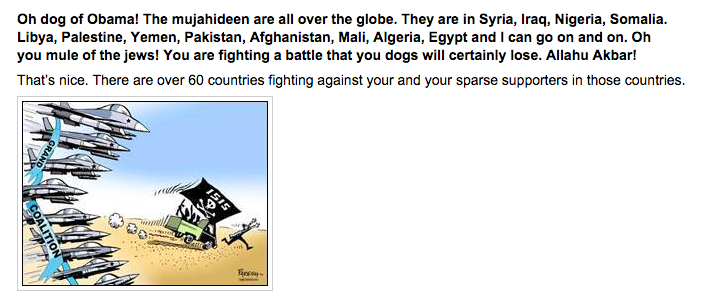
Oleg Zabielin/Shutterstock.com
Why We’re Losing the Brand War Against ISIS
A better narrative could end terrorism once and for all.
“The supreme art of war is to subdue the enemy without fighting.”
― Sun Tzu, The Art of War (513 BC)
Defeating ISIS messaging should be a piece of cake — right? After all, everybody says “they’re a bunch of loony radicals.” How hard can it be to unmask them for what they are?
But we are struggling. As The Washington Post reported (Dec. 2, 2015), a panel of private sector branding experts commissioned by the State Department to review anti-ISIS messaging did not come back with a positive report.
According to one official quoted on background, the group “had serious questions about whether the U.S. government should be involved in overt messaging at all.”
While the State Department has declined to release the actual report, The New York Times (June 12, 2015) reported receiving a “sensitive but unclassified” memo dated three days earlier from a source in the Obama administration. In it, Richard Stengel, undersecretary of State for Public Diplomacy and Public Affairs, says bluntly: “The coalition [to fight ISIS through coordinated messaging] does not communicate well internally or externally.”
From an external communication perspective, says Stengel, “our narrative is being trumped by ISIL’s. We are reactive — we think about ‘counter-narratives,’ not ‘our narrative.’ ”
But it is worse than that. In a Gizmodo commentary on the Post story, Kate Knibbs tore into the government’s failed attempts to respond to ISIS messaging effectively: “Scrolling through the questions and answers [on Ask.fm, an anonymous Q&A website used by the State Department as one way of combating ISIS through social media] is an exercise in rapidly losing confidence in the governments’ ability to wage a propaganda war.”
Here is an example of one well-intentioned but nevertheless groan-worthy interchange:

Screenshot of State Department interaction with ISIS on Ask.fm [11 months ago], via Gizmodo.com
There’s no other way to put it: Surely we mean well, but the government is just so very uncool — so incredibly out of touch — when it comes to doing what it takes to fight ISIS and win.
The first mistake we made was underestimating them. ISIS recruitment tactics, targeted both at young men and women, are working; they are experiencing “frighteningly rapid global growth,” despite President Obama famously calling them the “JV [junior varsity] team.”
Their recruitment tactics are highly sophisticated, speaking the language of their targets, using the preferred communication methods of their audiences, telling them precisely what they want to hear. Boys are lured by the promise of sex; girls, ironically, are told that joining the group is akin to feminism.
Just like any strong brand narrative, ISIS content represents messages that matter to the target, and that are extremely different from what they hear, at least in the Western mainstream. It isn’t just one thing, of course — there are dimensions of empowerment, of religion, of making the world a more just and less decadent place.
ISIS also is the classic cult: offering a self-contained, secret world, initially appealing but with no chance of escape, to a population that frequently feels lost, alienated, and perpetually in transition. In a world where the choices can feel like a blizzard of dead ends, ISIS inserts itself as a ready-to-wear community with a winning path toward the future.
They do not operate arbitrarily or off-the-cuff, either: ISIS has more than one playbook, each for specific ends, and they follow the strategy carefully.
We’ve made a lot of other mistakes as well, some of which The Washington Post covers pretty comprehensively, especially here and here.
They include:
- Denying reality: underestimating the enemy, refusing to not only name the enemy but describe the nature of its identity, failing to talk about our role in creating the problem, overestimating our successes, delaying for a lengthy period of time to admit that we are at war.
- Playing defense: failing to tell our story, over-focusing on the enemy’s tools of choice, insisting on explaining over and over again “why they’re wrong and we are right.”
- Incompetence: “talking the brand talk” but failing to put expert communicators in charge; confusing the message with the medium; unrealistic ideas about metrics; overemphasizing logic versus emotion, or emphasizing the wrong emotional points; condescending to the audience.
- Bureaucracy: Letting infighting derail the process, overemphasizing internal reactions, short-term thinking, delaying the formation of the team for a significant period of time, failing for too long to insist on staff and money from partners, failing to effectively leverage the national and international partners on the team.
- Insularity: Refusing to bring in competent help from the outside for too long, failing to give the private sector the reins and invest in their expertise as needed.
ISIS is a new kind of enemy, and it was inevitable that we would make mistakes in fighting them — yes, even significant ones. We can’t afford to look back and indulge in hand-wringing. It’s time to chart a new course.
We begin at the beginning: In branding, as in war, constantly playing defense is a good way to get killed. This is because brand equity depends on constantly telling the consumer why they should pick you — not on telling them why they shouldn’t pick your competitors.
By communicating proactively and positively with the customer, you develop the three key characteristics of a strong brand. This is the framework provided by top market research firm Millward Brown:
- Salient: It’s top-of-mind when it’s time to buy.
- Meaningful: It’s the most meaningful to you — you’re emotionally and intellectually attached to it.
- Different: It’s the one that stands out as unique.
Al Ries, one of the world’s preeminent authorities on branding, explained the importance of playing offense in Positioning: The Battle for Your Mind. Not only that, said Ries, but the key to success is knowing your customers, knowing how they think, and shaping their perceptions. As he put it: “Positioning is not what you do to a product. It’s what you do to the mind of your prospect.”
With that in mind, here is what we need to do right now:
- Be honest: The enemy is not just a particular group. It is a brand that can loosely be described as “radical Islam.” Elements of this group are fundamental to Islam itself, albeit the nonviolent version. We must understand who we are dealing with and shut them down.
- Playing offense: There is a version of Islam that does not embrace elements that pose a threat. Many Muslims live their lives by this version. We need to immerse ourselves in their story, and combine it with the story of America, integrating the two in such a way that our nation evolves. What began as a “Christian nation” can no longer be described that way: We are a patchwork of religions and cultures and the story of that diversity is more compelling than an ideology of hate.
- Competence: The government must hire, from within, professional communicators well-versed in branding — not just antiterrorism experts or Middle East subject matter experts. You shouldn’t drive a car unless you have a driver’s license.
- Prioritize Efficiency and Effectiveness: Those of us who work in government are familiar with the ways bureaucracy thwarts success. The administration must act to eliminate the barriers faced by the State Department in its public diplomacy mission.
- Controlled Openness: There is a balance to be struck here between the one extreme of insularity, and the other extreme of letting the private sector “take over.” The balance is achieved by having a government communicator oversee a large and diverse team, with a clear chain of command and well-defined roles and responsibilities.
In his address to the nation on Dec. 6, President Obama assured us that we would ultimately defeat ISIS. Reassurances are nice, and I believe the news reports suggesting that the president is frustrated by our messaging failures thus far. But as they say, “the definition of insanity is doing the same thing over and over again and expecting a different result.”
We can do a better job at this. We can render ISIS irrelevant. But if we’re going to do it, we need to go in strong, play hard and finish the job.
Stengel is correct: The task is not about crafting a good “counter-narrative.”
It is about giving the microphone to Muslims all over the world who seek to redefine Islam itself in the eyes of the world. In a sense, what's needed here is to rebrand a religion and our nation at the same time: Islam as peaceful, in the manner suggested by many prominent religious reformers, and the United States as inclusive and respectful of many faiths.
We ought to invest in this. Branding is much more important to our security than fighting: It can save many lives, and leave us with a lasting peace.
Telling a better story isn't just about selling soap flakes. It can be about changing the world for the better. And when we embrace a better narrative — all of us, not just the USA — we will see an end to terrorism once and for all.
Copyright 2015 Dannielle Blumenthal, Ph.D. The opinions expressed are her own, and the content of this post is not intended to represent any federal agency or the government as a whole.






